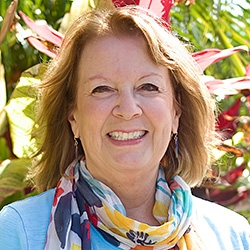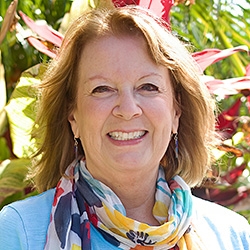

Search Results: grief
-
What are the most powerful things I can do to build an inspired relationship? I answered the question with romantic relationships in mind; however, I believe the answer below applies to all important relationships.
-
What could be, more often than not, overlooked when we think about or represent NVC or Marshall Rosenberg's work? This article busts some commonly held ideas and approaches to NVC. It challenges us to widen the lens of what it really means to be "life-serving", or speaking and hearing the "language of life". And it also speaks to how thinking can deepen feeling and relatedness...
-
- Celebrate and nurture your relationship to the Earth — and each other!
- Explore your connections to family, partner, work, nature, self and more
- Discover new ways to grow in community and work together to make this world a better place
- Engage and immerse yourself in NVC while making new friends!
-
Some things may seem to take longer at first, but end up making things easier and faster. Other things seem easier or faster in the short term, but end up taking more time in the long run. This applies to projects, group agreements about process, relationships, addressing conflicts, clearing up misunderstandings, damage control, etc. It can be faster to slow down, be more present, and take the time since we care about the outcome.
-
When we feel pain about humans relate to, and conflict with, one another on Earth what can give us capacity to transform it? Perhaps in connection to the formless consciousness of unity we may relax, open, expand -- and connect to formless human needs, a sense of universal well being, benevolence and good will. Loving action flows from here. Suffering shifts into deep healing, grace and new possibility.
-
Trainer Tip: Sometimes the expression of our needs can sound like demands or criticism. This can make it harder for people to want to contribute to us. Today, pay attention to how you express your needs. Find ways to release the emotional charge.
-
Trainer Tip: Here are four Stages of Emotional Maturity, also known as Stages of Emotional Liberation. Be aware of what stage of emotional maturity you are in today. And, celebrate it.
-
Hello,
I’m Iris Bawidamann. When Mary reached out to me asking if I’d write this letter, I sat for some time meditating on what is alive for me and what I want to share with you… This is what surfaced for me… Fear sits with me—on my shoulders, in my chest. A familiar presence I consciously keep in check so it doesn’t take over. Watching global politics, conflicts, and rising polarization, I often feel overwhelmed. The world is shifting.
-
There are times when someone judges us, or meets us with prejudice, and its easier for us to respond by hating them, or judging ourselves as not good enough. How can we love another person instead without excusing their actions? Roxy tells us her story with wonderment, grief and mourning.
-
When we're judging we're less able to access both what we care about and constructive next actions. Instead, create more internal space and agency starting with connecting to your feelings and needs; then feel your grief or disappointment; followed by getting curious about the other party's needs and context -- and then based on collective needs and the long term effects make requests or take aligned action that works for all.
-
In some situations you might expect people to show a degree of maturity or skill. When they don't, your anger-fueled response doesn't lead to lasting improved relationship change. Instead, find someone who retains focus on your feelings and needs rather than colluding with you about what should(n't) be. This can support greater acceptance, grief, vulnerability, groundedness and discernment, from which next steps can arise.
-
Connecting with self and other is key to care and creativity. Before dialogue connect with your intention and needs for being with grief, fear or pain, and empathy. Dialogue when you're both rested, fed, and have spaciousness. Start by expressing care and desire to find mutually satisfying solutions. To deepen connection you may repeat what you hear and ask the other person to do the same.
-
When we care about our cause and want to mitigate disaster, we may become reactive. However, transformation comes through connection, rather than convincing, judging, criticising, controlling, and making demands of others. To inspire change, get curious about how they relate to the topic – and get support for yourself elsewhere to process grief, become more present and compassionate, speak self-responsibly, and make requests.
-
Anger is a sign that you're resisting what's happening because you perceive an overwhelming threat, not trusting yourself to handle what's happening directly. Vulnerable feelings under anger are usually fear, hurt, or grief. Experiencing and expressing these feelings and connecting them to your needs, gives you access to more skill, insight, compassion, and wisdom. Read on for 3 questions to ask yourself when angry.
-
Confidence, flexibility, creativity and equanimity may become more possible when you would like someone to meet a particular need, can trust that you can meet that need with someone else, and can accept a “no” to your requests. You can allow grief or disappointment to arise, and naturally turn towards a relationship in which those needs can be met. In some cases this may lead to the dissolution of a partnership or friendship.
-
There's a danger in using empathy exchange to perpetually recirculate and exchange pain (often by telling and re-telling the same old stories), rather than using it as a catalyst for transformation. It can create and further pain in whatever form: anger, destructiveness, hatred, grief, emotional drama, and violence. It can also reinforce dualistic evaluations of "met" vs "unmet" needs. And it can slow down productivity.
-
Anger is neither good nor bad. When you don't foresee it or you haven't cultivated a relationship to anger, you may behave from it and hurt yourself and others. There are three reasons anger may rise: primitive anger, resistance, and lack of resources. For practicing with these last two types of anger, we'll look at four practices: cultivate awareness, pause and expand, self-care and planning, and allow grief.
-
In this moving reflection, Rachelle Lamb honors Marshall Rosenberg’s true vision for Nonviolent Communication—not just as a tool for personal transformation, but as a catalyst for deep social change. She reminds us that inner work alone is not enough in a world facing ecological collapse, rising suicide rates, and widespread displacement.

Quick Links
Subscription Preferences
Stay In Touch!
Looking for ways to keep up with NVC Academy news, get special offers, free resources, or words of inspiration? Here are five ways to stay engaged:


















